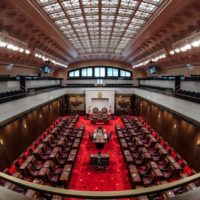News
Parliamentary conference to focus on Senate
The Canadian Study of Parliament Group is hosting a conference on September 14 in Ottawa.
The increasingly independent Senate – and how the renewed institution is improving legislation with thoughtful review – will be a focal point at an upcoming Parliamentary conference in Ottawa.
The Canadian Study of Parliament Group event on September 14 will delve into the rapidly changing relationship between the Senate and the House of Commons, as well as zero in on the delicate balance of modernizing the Senate while also maintaining 150 years of tradition.
The current Government has only appointed independent Senators, relying on an independent advisory board to make recommendations rather than partisanship. So far, 38 independent Senators have been appointed while many more have made the choice to leave partisan caucuses in favour of independence. An institution previously organized along partisan lines now has a majority of independent Senators.
The Senate has successfully amended a quarter of Government bills this session, making key changes to a range of legislation, including laws on transportation, medical assistance in dying and the legalization of cannabis. Though the Government has not always accepted proposed Senate changes to its legislation, the intensive debate that grows from the suggestions raises the profile of important issues and allows Canadians to engage more deeply with the Parliamentary process.
One panel at the conference, “A Check in on the Senate Modernization Process,” will look at recent changes in sober second thought, including questions surrounding how the Senate conducts its business as it grows more and more independent.
Senator Peter Harder, who serves as the Government Representative in the Senate, has raised the idea of creating an inclusive business committee to establish tailor-made schedules for each bill’s progress through each stage of the legislative process. Formerly stylized as the Government Leader in the Senate, the change of title reflects the change of role, as the Government Representative does not lead a caucus.
Moves to make Parliament more inclusive will also be explored at the conference. The current Government, for example, has maintained a cabinet with an equal number of men and women, while the Senate is approaching gender equality with women making up 44 per cent of current Senators.
Find out more about the conference here.




















































